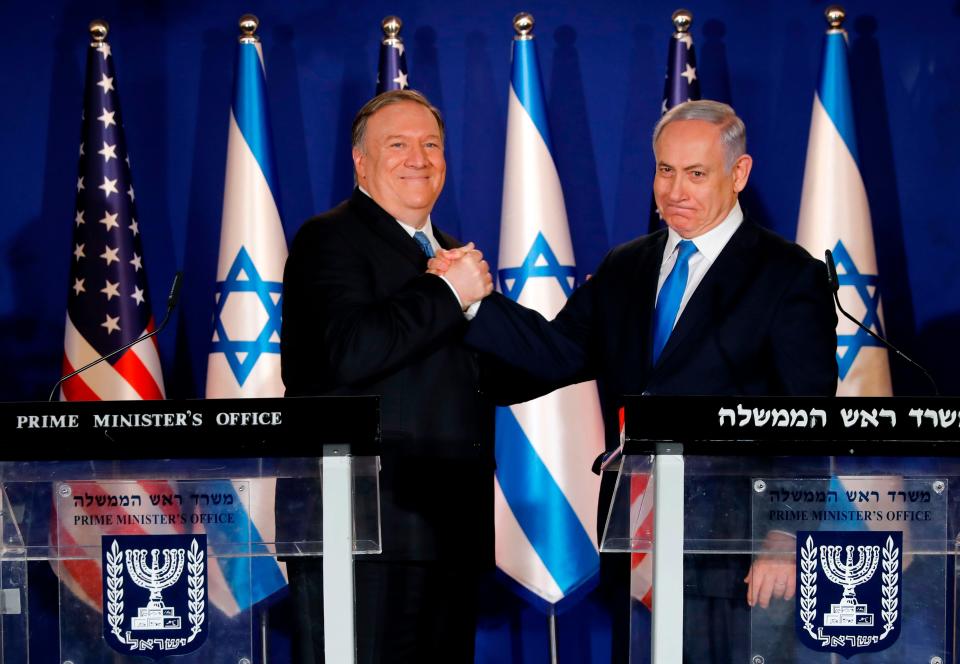Pompeo to resume travel with a tightly controlled visit to Israel, as pandemic continues to grip the world
Secretary of State Mike Pompeo will travel to Israel next week, his first trip in about seven weeks as the coronavirus pandemic grounded the nation's top diplomat along with the rest of the world.
It will be a quick, controlled visit – with Pompeo's interactions limited to individuals who have been tested for the virus or screened for symptoms, a top State Department physician said in a briefing with reporters on Friday.
"This is a tightly controlled movement in a highly screened environment that we feel is very, very safe," said William Walters, the State Department's deputy chief medical officer for operations. He said everyone traveling with Pompeo will be tested a day or so before getting on the plane, and anyone he interacts with on the ground in Israel will be screened.
"The secretary’s physician will be on hand at all times" and masks will be used in accordance with the U.S. Centers for Disease Control and Prevention's recommendations, Walters said. He said Pompeo will hold his meetings and get right back on the plane to return to the U.S.
Pompeo plans to meet with Israeli Prime Minister Benjamin Netanyahu as well as Benny Gantz, a centrist rival, who is working to form an emergency coalition government with the conservative Netanyahu and is now speaker of the country's Parliament.
Israel has started to loosen its coronavirus restrictions in recent days amid a decline in new infections. The government has also launched a massive effort to test Israelis for antibodies to COVID-19, to measure what percentage of the population has been exposed to the virus and thus how vulnerable the country is to a second wave.
Overall, Israel has suffered a lower death rate than many other nations. The country of approximately 9 million people has reported 16,314 infections and 238 deaths to date, according to data from the World Health Organization.
But the situation is more worrisome in the West Bank, where many Palestinians live in overcrowded conditions and the health care system is weak. The United Nations relief agency for Palestine refugees has issued a global appeal for $93 million to address the situation, but the Trump administration cut off funding to that U.N. agency in 2018.
The Trump administration has provided $5 million in international disaster assistance funds to another group doing COVID-19 response in the West Bank. Assistant Secretary of Near Eastern Affairs David Schenker was non-committal when asked about the possibility of additional assistance for the Palestinians.
Pompeo's visit is likely to focus less on COVID-19 than on Israel's controversial plans to annex parts of the West Bank, land it seized in a 1967 war but that is claimed by the Palestinians. Palestinians view Israeli settlements in the West Bank as illegal, a position shared by many other countries and world leaders.
In a reversal of longstanding U.S. policy, the Trump administration said last year that it no longer considered Israeli settlements in the West Bank a violation of international law.
And President Donald Trump's much-touted peace plan – crafted by Jared Kushner, the president's son-in-law and adviser, and unveiled in January – recognizes Israeli sovereignty over major settlement blocs in the West Bank.
Netanyahu has used the shifts in U.S. policy to move ahead with annexation plans this summer, even though they are deeply controversial among the Israel public and could end prospects for a two-state solution to the long-simmering Israeli-Palestinian conflict.

Asked about Netanyahu's plans during an April 22 press briefing, Pompeo said: "That’s an Israeli decision, and we will work closely with them to share with them our views of this in a private setting."
Pompeo's visit to Israel will be the first such diplomatic mission since Israel closed its borders in an effort to slow the spread of the novel coronavirus, according to local Israeli media reports.
During a press briefing on Wednesday, Pompeo sounded eager to resume his busy global travel schedule.
"It’ll start off smaller, but we’re hoping to get back at it, just like we’re hoping that we can get the economy back open not only here in the United States but all across the world as well," he told reporters.
Walters would not say if the Pompeo's trip required a special exemption from Israel's stay-at-home restrictions. But he said the visit had been coordinated with the Israeli government.
Pompeo's last international trip was at the end of March, when he traveled to Afghanistan amid concerns the US-negotiated peace deal with the Taliban was in jeopardy.
This article originally appeared on USA TODAY: Coronavirus: Mike Pompeo resumes diplomatic travel with trip to Israel

